8+ Sample Restaurant Event Contract
-
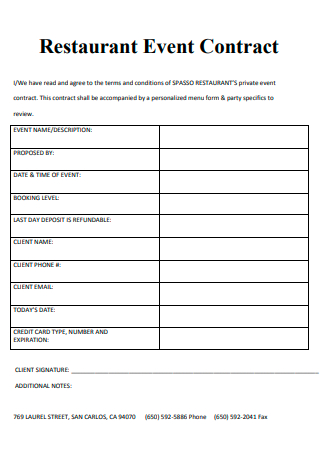
Restaurant Event Contract Template
download now -
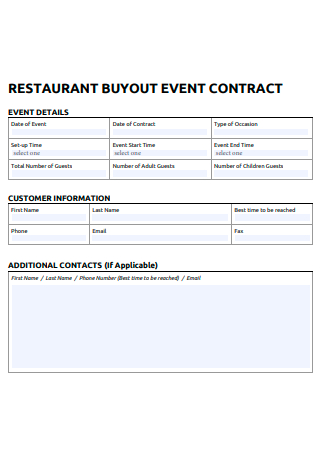
Restaurant Buyout Event Contract
download now -
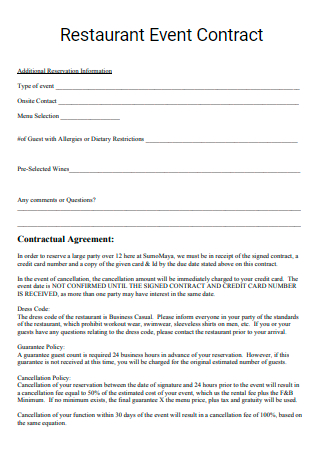
Restaurant Event Contract Example
download now -
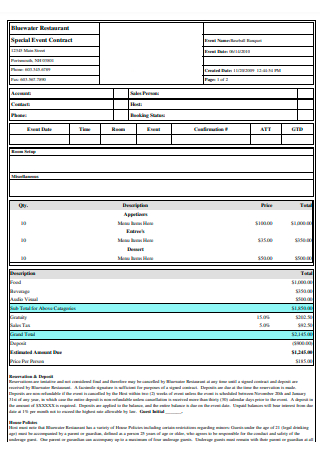
Restaurant Special Event Contract
download now -
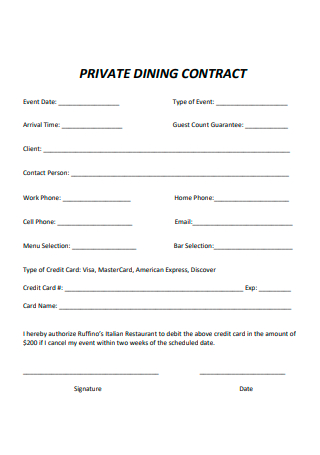
Restaurant Private Dining Event Contract
download now -
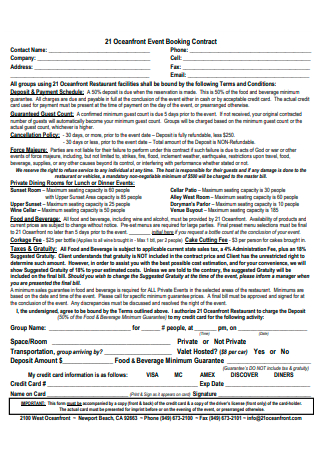
Restaurant Event Booking Contract
download now -
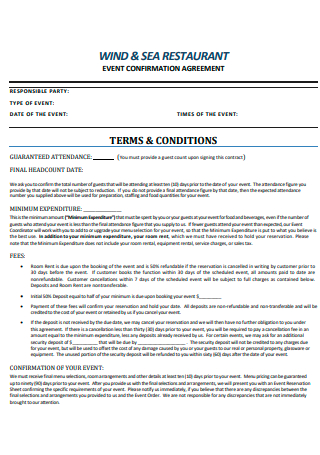
Restaurant Event Confirmation Contract
download now -
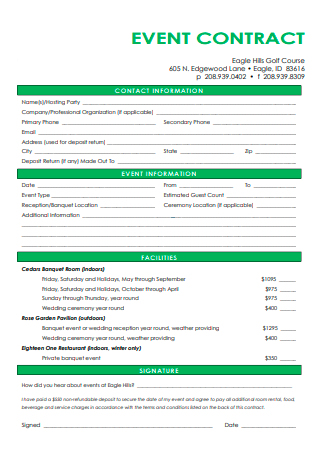
Formal Restaurant Event Contract
download now -
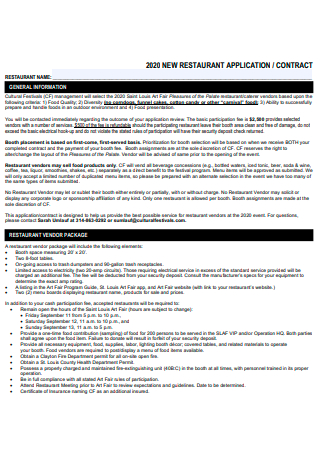
Restaurant Application Event Contract
download now
FREE Restaurant Event Contract s to Download
8+ Sample Restaurant Event Contract
What Is a Restaurant Event Contract?
Reasons to Use an Event Contract
How to Write a Restaurant Event Contract
Different Kinds of Clauses
FAQs
Why is a contract important?
What is the foodservice agreement?
What are examples of restaurant events?
What Is a Restaurant Event Contract?
A restaurant event contract is a legally binding document that outlines the terms and conditions of a client’s agreement with a chosen restaurant. A contract with an event planner serves as a safety net. Never agree to any task based only on a verbal agreement. This is applicable even if you are working with a long-term customer who is already a loyal contact. The contract not only protects you financially but also eliminates unnecessarily unpleasant disagreements that may damage business relationships. There is an available restaurant event contract template that you can make use of as much as you like.
Reasons to Use an Event Contract
Creating exclusive contracts for event planning and event management, regardless of the size of the client’s business, will make events run much more smoothly. There is no better protection for an event company in the long run. When things like these go wrong, the event company frequently loses out. Consider the following reasons and see for yourself why event contracts are necessary.
How to Write a Restaurant Event Contract
After defining what a restaurant event contract is and the reasons that have been laid out for you to go over, it is time to lead you to the guide in which you will be writing your restaurant event rental contract. The steps are simple enough to follow through and will help guide you through the process. Templates are here to help you as well and have been provided in the article for you to use. Don’t forget though to put your unique touch to the content and have it catered to the preferences of your specific client as well.
-
Step 1: Include General Information
This part is where you would give exact details of the event type, the date and time of the event, the specific starting time of the event and the end, location with entire address, venue contact person, and type of services being delivered, in addition to basic client information such as full name, complete address, and phone. When describing the Scope Of Services supplied to a client, don’t assume they will instinctively understand what isn’t included.
-
Step 2: Define Payment Policy
The deposit is used to reserve a time on your Calendar. Deposits might range from 25 percent to 50 percent of the overall event cost. Always demand a deposit in exchange for your services. It communicates to the client that your time and skills are valuable. Deposits should be non-refundable, according to your contract. In events, a deposit can refer to two separate things. Some venues, for example, will ask for a deposit to hire out their space. Some venues may refund the deposit given to the customer once the event is completed and the venue manager has confirmed that the client has left everything clean and neat.
-
Step 3: State the Payment Schedule
The payment Schedule of your contract should be established by the client’s comfort level and the length of the contract. You and your client should select whether payments will be made monthly, weekly, or half of the fee in advance, with the remainder payable on a specific number of days before the event date. For funds received after a specific deadline, some planners add a late fee. All payments for that restaurant event should be paid upfront and the whole amount paid should be non-refundable in the event of an emergency necessity. You should also state the method of payment for the transaction process.
-
Step 4: Add a Termination Clause
Termination clauses are not to be confused with cancellation terms. Termination refers to the cancellation of a contract due to unforeseen circumstances beyond either party’s control. Weather-related events, a government shutdown, a pandemic, or another tragedy are all possibilities. A termination clause specifies the circumstances under which neither party is accountable. Of course, these possibilities are improbable, but anything may happen at any time. This helps to protect you and your planning company as well as your client to some extent.
-
Step 5: Clarify the Cancellation Terms
We all know that certain situations and issues occur and that things don’t always go as planned. If your customer has to cancel their event, your contract should specify that the cancellation must be submitted in writing one or two weeks before the event date. Indicate what charges or fees will be payable if the reservation in the restaurant is canceled. You could also include that the paid amount won’t be refunded especially if the date they canceled is close to the actual event date.
Different Kinds of Clauses
Concerning issues that can be unforeseen and unavoidable, you will prioritize the protection of your event planning business. Clauses are the answer. Knowing this curated list will also help you to be aware of what are the kinds of clauses that can be considered and legitimate for your Business.
FAQs
Why is a contract important?
Contracts give a written contract that explains the whole knowledge of the business relationship and scope of work, ensuring that no misunderstandings arise afterward. They spell out exactly what rights you are buying and what rights you are keeping. They are legally binding and enforceable.
What is the foodservice agreement?
A food service agreement is just a contract between a non-profit organization and a restaurant or foodservice company. These agreements are sometimes created to help people in times of need. This agreement will detail all connected terms and conditions, regardless of which party you are. If you would want to employ a Catering Service, then you should prepare a catering agreement to ensure that both parties have come to a clear understanding of the terms and conditions of their obligations to each other.
What are examples of restaurant events?
Some events taking place in a restaurant don’t have to be the usual events. Some examples can be not-so-popular holidays, karaoke nights, charity events, hosting a live gig, etc. Make sure to clarify this with the restaurant to ensure the event Venue contract has stated the necessary restaurant event packages. This includes designs, the menu, music ambiance, and atmosphere to relate to the chosen and specific theme.
Guests would want the full private dining experience, especially if they are celebrating an event as a group or with a large number of guests. As the event planner, it is your responsibility to bring to the discussion the restaurant event contract to protect your company and the client’s interests as well. This ensures that both parties have come to a conclusion to the details included in the contract. If you still have not checked out the restaurant Private Event Contract template, then it is advisable that you do so.
